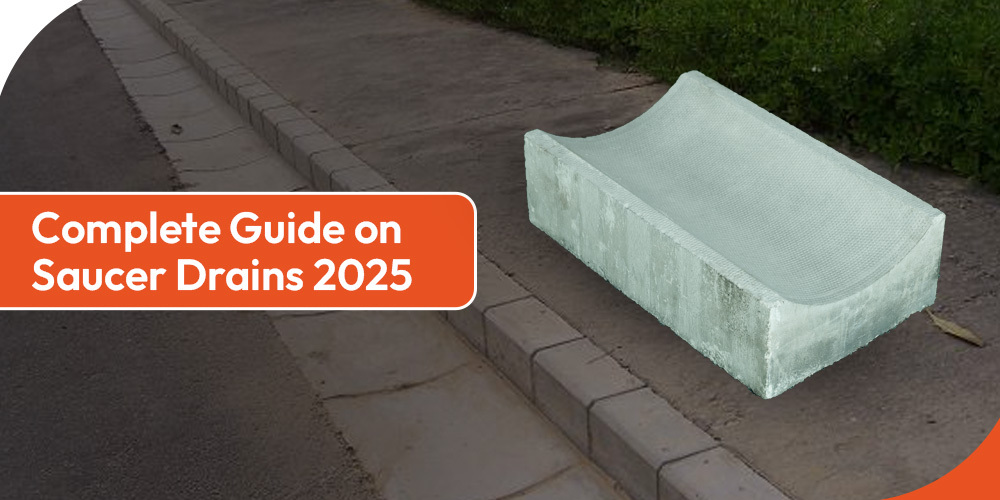What is a Saucer Drain?
A saucer drain is a precast concrete drainage unit with a concave or dish-like shape designed to collect surface water and channel it toward stormwater systems. Its purpose is to ensure proper water runoff management for roads, parking areas, and landscaped zones.
The precast nature ensures uniform quality, structural strength, and faster installation compared to conventional in-situ methods.
Key Specifications of Saucer Drains
Dimensions
Saucer drains are manufactured in different sizes and thicknesses to accommodate various project requirements:
| Manufacturer | Size (L × W × H) mm | Thickness (mm) | Type |
|---|---|---|---|
| Sneh Precast | 500 × 325 | 100 / 125 / 150 | Plain / Perforated |
| BRHC Concrete Industries | 300 × 300 | 75 / 100 | Plain / Perforated |
| Acme CC Products | 300 × 600 | 75 / 100 | Plain / Perforated |
| Dynamic Concrete Products | 300 × 300 | 75 / 100 | Plain / Perforated |
Notes:
- Larger drains are suitable for highways and heavy runoff areas.
- Smaller drains are recommended for residential complexes, pedestrian zones, or landscaped areas.
Material and Strength
- High-grade concrete (M30 or above) is used for all precast saucer drains.
- High compressive strength ensures durability under light to moderate vehicular loads.
- Low water absorption prevents erosion and enhances lifespan.
- Weather and chemical resistance ensure functionality under diverse environmental conditions.
Types of Saucer Drains
-
Plain Saucer Drains
- Solid units without perforations.
- Suitable for areas where water must be collected and channeled to storm drains.
-
Perforated Saucer Drains
- Feature holes to allow water infiltration.
- Used in landscaped areas to aid groundwater recharge.
-
Fiber Reinforced Plastic (FRP) Saucer Drains
- Lightweight and corrosion-resistant.
- Ideal for chemical-prone areas or where weight reduction is required.
-
Custom Designs
- Curved or sloped drains for specialized applications.
- Offered by Sneh Precast & Consto Solutions based on project-specific requirements.
Applications
Saucer drains are versatile and can be applied in multiple sectors:
| Application Area | Purpose and Use |
|---|---|
| Roadside Drainage | Installed along roads and kerb stones to prevent waterlogging and direct runoff to stormwater systems. |
| Urban Landscaping | Manages water overflow in parks, gardens, and commercial landscapes. |
| Parking Areas | Directs water away from parking surfaces to prevent damage and slippery conditions. |
| Residential Complexes | Protects buildings and pavements from water accumulation. |
| Industrial Zones | Channels runoff efficiently to prevent infrastructure damage. |
| Highways / Metro Roads | Handles heavy water runoff in high rainfall areas for safe road conditions. |
Benefits of Saucer Drains
- Efficient Surface Water Management - Smoothly channels water into stormwater systems.
- Durability - High-strength concrete ensures long-lasting performance under traffic and weather exposure.
- Versatility - Available in multiple sizes and types to match site requirements.
- Precast Design - Consistent quality and faster installation than traditional drainage.
- Maintenance-Friendly - Easy to inspect and clean, maintaining effective water flow.
Installation Process
-
Site Preparation
- Excavate trench according to drain dimensions.
- Ensure proper slope for gravity-based drainage.
-
Base Layer
- Lay compacted sand or concrete bedding for stability.
-
Placement
- Align precast units carefully with proper slope and connections.
-
Backfilling
- Stabilize sides with soil or concrete.
-
Connection to Stormwater Systems
- Connect drains to stormwater pipes, pits, or infiltration areas.
-
Inspection
- Verify alignment, slope, and flow clearance to ensure optimal function.
Maintenance Guidelines
- Clear debris such as leaves and stones regularly.
- Inspect for cracks or surface damage.
- Ensure perforated drains are not blocked to maintain infiltration capacity.
- Perform routine maintenance at least every six months or after heavy rainfall.
Common Issues and Solutions
| Issue | Solution |
|---|---|
| Water pooling near roads | Re-align drains and correct slope. |
| Debris accumulation | Regular cleaning prevents clogging. |
| Cracks or surface damage | Use high-grade concrete and proper bedding. |
Conclusion
Saucer drains or source drains are essential for modern urban drainage systems. Their precast concrete construction, durability, and ease of installation make them a reliable solution for roads, residential complexes, industrial areas, and landscaped zones.
At Sneh Precast & Consto Solutions, we provide high-quality precast saucer drains designed to meet engineering standards and project-specific needs. Integrating these drains ensures:
By adopting properly designed and installed saucer drains, urban planners and contractors can reduce waterlogging risks, prevent road and landscape damage, and promote sustainable infrastructure development.

